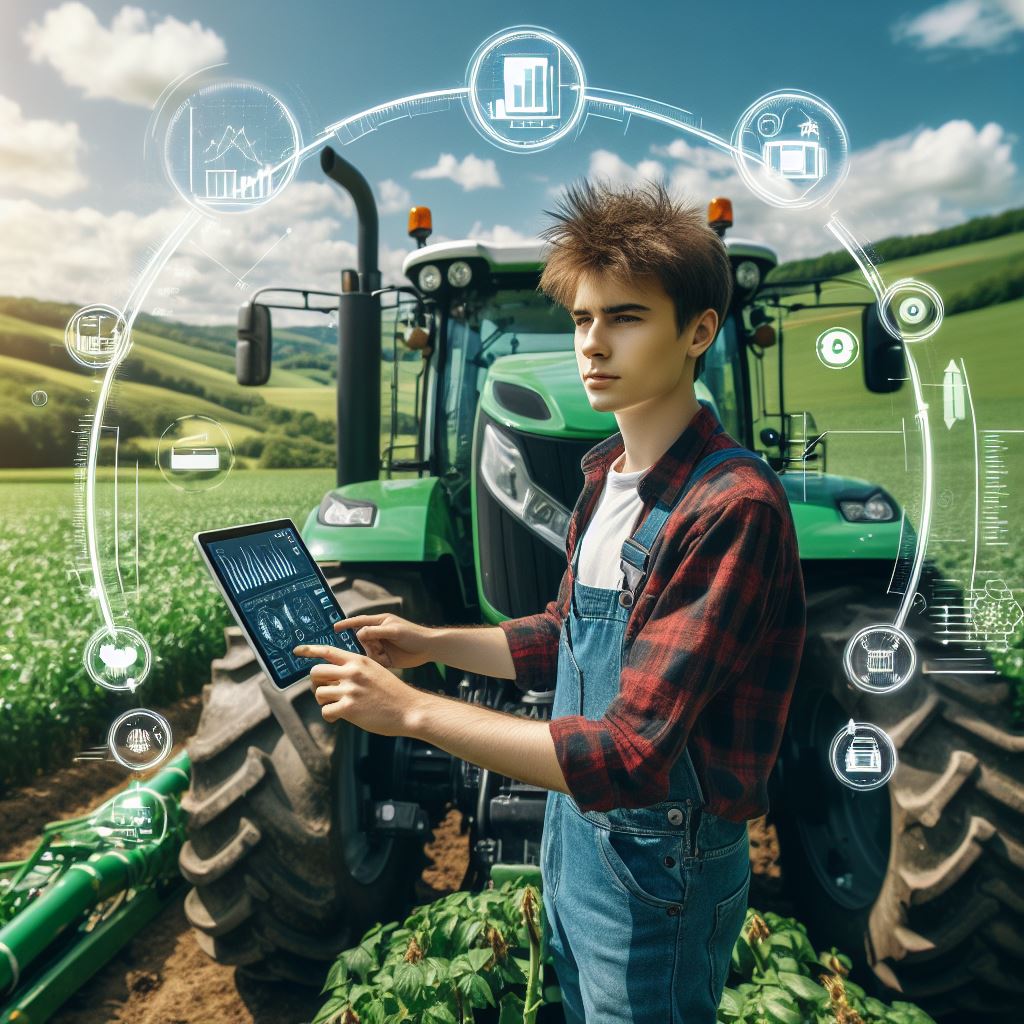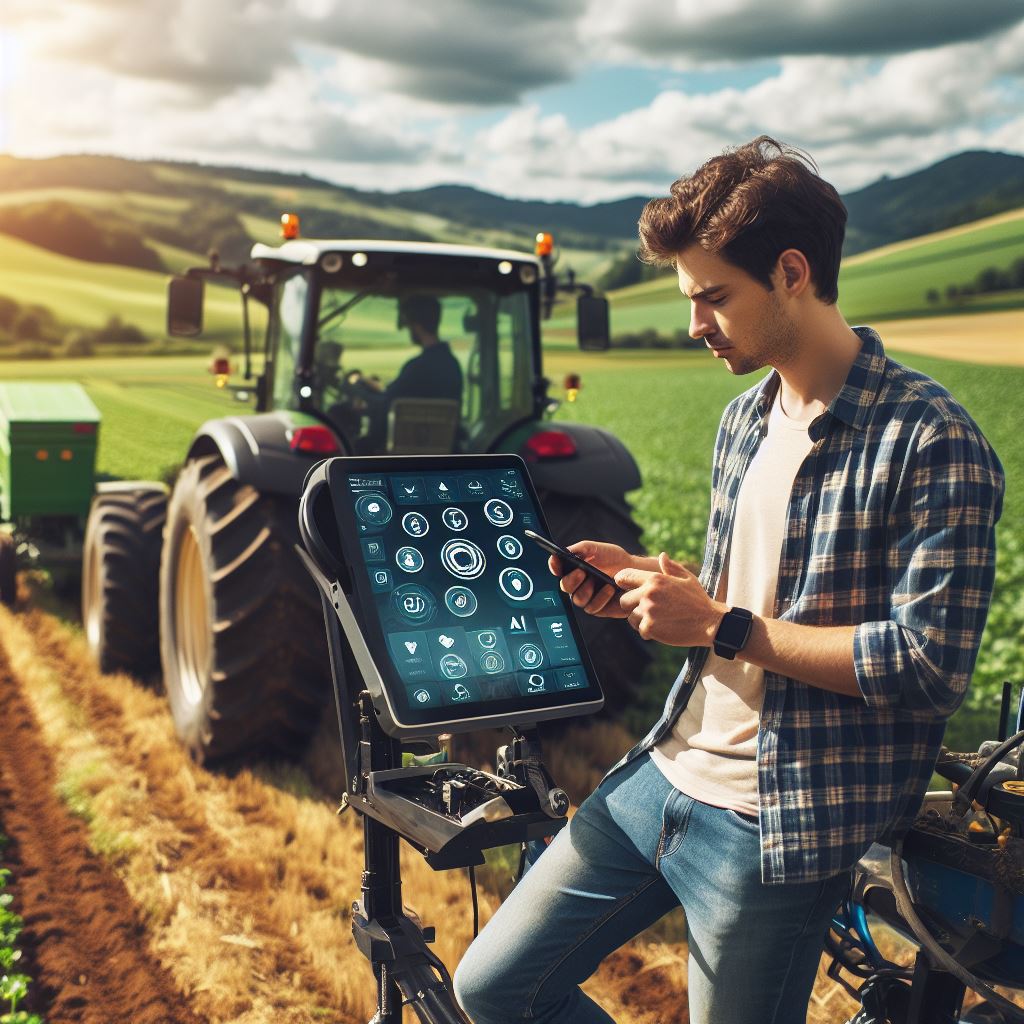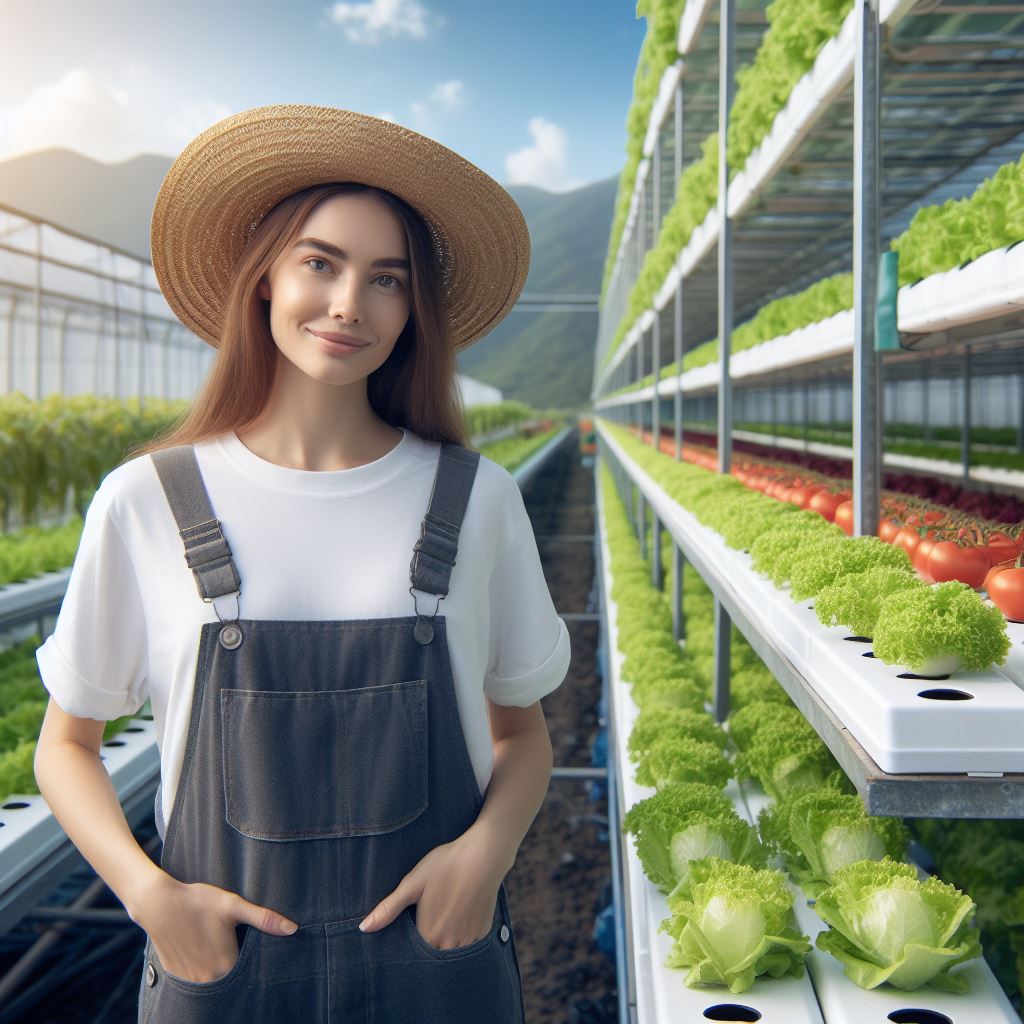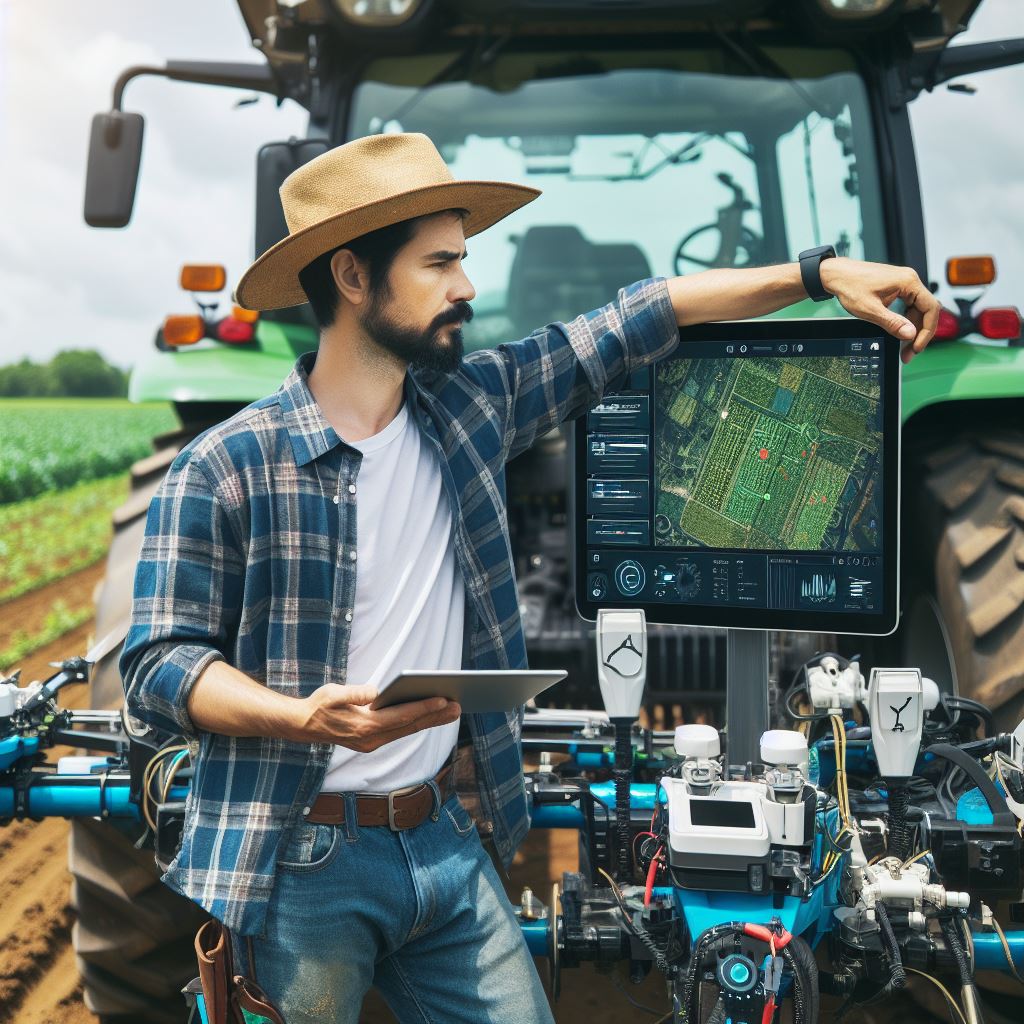Introduction
By exploring “AI and Crop Management Tech Trends” we understand farmers can enhance their decision-making process, resulting in better crop yields.
Crop management plays a crucial role in ensuring food security and sustainable agriculture.
AI-powered systems can collect and analyze vast amounts of data, including weather patterns and soil conditions.
These insights allow farmers to make informed decisions about planting, irrigation, and pest control.
By using AI algorithms, farmers can predict crop diseases, identify nutrient deficiencies, and optimize resource allocation.
The application of AI in crop management enables precision farming, reducing the need for excessive pesticide and fertilizer usage.
Moreover, AI-powered drones and robots can automate tasks such as crop monitoring, weed identification, and yield estimation.
These technologies improve efficiency, reduce labor costs, and minimize environmental impact.
In summary, AI is reshaping crop management by empowering farmers with data-driven insights and automation.
The adoption of AI technologies paves the way for sustainable agriculture, ensuring food security for future generations.
Understanding Artificial Intelligence (AI)
Definition of AI
Artificial Intelligence (AI), a transformative technology, refers to the simulation of human intelligence in machines.
In agriculture, its potential benefits are vast. Enhanced efficiency, precision, and decision-making are key advantages.
AI’s definition in agriculture involves using advanced algorithms and computational power to analyze vast datasets. It goes beyond traditional farming practices, ushering in a new era of smart agriculture.
Potential benefits of AI in agriculture
- Improved efficiency: AI can automate tasks, reducing the time and effort required for crop management processes.
- Enhanced precision: AI technologies enable precise monitoring, analysis, and control of crop-related variables for better outcomes.
- Better decision-making: AI algorithms can process vast amounts of data to provide actionable insights for informed agricultural decisions.
Impact of AI on crop management
The integration of AI revolutionizes crop management by optimizing production, reducing costs, and enhancing sustainability.
- AI algorithms process data from various sources to optimize planting schedules, irrigation timings, and pest management strategies.
- By integrating weather forecasts, soil data, and crop health indicators, AI enhances crop management efficiency.
- Predictive analytics enable farmers to anticipate crop diseases and pest outbreaks, allowing for proactive measures.
- AI-powered drones and sensors monitor crop health, identifying areas requiring attention and guiding resource allocation.
- Real-time data analysis allows farmers to adapt quickly to changing conditions, maximizing yields and minimizing losses.
In essence, AI offers immense potential to revolutionize crop management practices and address challenges in agriculture.
Transform Your Agribusiness
Unlock your farm's potential with expert advice tailored to your needs. Get actionable steps that drive real results.
Get StartedBy embracing AI technologies, farmers can leverage its benefits to optimize crop production, reduce costs, and mitigate risks.
The continuous integration of AI in agriculture can lead to a more sustainable and productive future for the industry.
Read: Next-Gen Farming: The Role of Drones
AI Applications in Crop Management
Artificial Intelligence (AI) has revolutionized various fields, and crop management is no exception.
From data collection and analysis to predictive modeling and automated decision-making, AI brings numerous benefits to farmers.
In this section, we will explore the different applications of AI in crop management
Data collection and analysis
To make informed decisions, farmers need accurate and timely data. AI technologies enable efficient data collection and analysis through the following methods:
- Remote sensing techniques: Machine learning advances, robotics integration, collaborative AI systems, and industry acceptance drive crop management transformation.
- Internet of Things (IoT) devices: IoT devices offer real-time data on parameters like soil moisture, temperature, and humidity, aiding continuous monitoring for farmers.
- Drones and satellite imaging: Advanced drones and satellite imaging provide high-resolution field images. AI algorithms analyze them for crop health, pest detection, and field assessment.
Predictive modeling and forecasting
AI algorithms can analyze large amounts of data and generate valuable insights for crop management. Some key applications include:
- Weather and climate patterns: AI analyzes historical weather data to inform farmers about planting, irrigation, and harvesting schedules.
- Pest and disease outbreaks: AI analysis detects patterns indicating pest and disease outbreaks, enabling early preventive measures and minimizing crop damage.
- Yield predictions: Based on historical data, AI models can predict crop yields with a high degree of accuracy. These predictions assist farmers in optimizing resource allocation and determining expected revenues.
Automated decision-making systems
AI technologies enable the automation of various aspects of crop management, reducing manual intervention and optimizing efficiency. Key examples include:
- Irrigation scheduling: AI algorithms automate irrigation scheduling by considering weather conditions, soil moisture levels, and crop water requirements, conserving resources and improving crop health.
- Fertilizer and pesticide optimization: AI optimizes fertilizer and pesticide use by analyzing soil, nutrient, and pest data, cutting costs and environmental impact while maintaining crop health.
- Harvesting and post-harvest management: AI automates harvesting with robotics and computer vision, offering insights into post-harvest management, storage conditions, and quality assessment.
In a nutshell, AI applications in crop management have the potential to revolutionize the agricultural industry.
From data collection and analysis to predictive modeling and automated decision-making, AI empowers farmers to make more informed decisions, optimize resource utilization, and improve overall crop productivity.
With ongoing advancements in AI technology, the future of crop management looks promising.
Read: Drone Imaging in Farms: A New Perspective
Benefits of AI in Crop Management
Artificial Intelligence (AI) is revolutionizing agriculture by transforming traditional crop management practices.
By harnessing the power of advanced technologies, farmers can leverage AI to enhance productivity, optimize resource utilization, detect problems early, and ultimately increase profitability.
Increased productivity
One of the significant benefits of AI in crop management is increased productivity.
AI algorithms can analyze a vast amount of data, including soil conditions, weather patterns, and historical crop performance, to optimize crop yields.
By identifying the ideal conditions for planting, growth, and harvesting, AI technology enables farmers to make data-driven decisions that enhance productivity and maximize output.
Resource optimization
- Water usage efficiency: AI algorithms can monitor soil moisture levels and regulate irrigation systems for optimal water usage.
- Reduction in chemical inputs: AI can help farmers identify appropriate pesticide and fertilizer use, reducing dependency and minimizing environmental impact.
Early problem detection and mitigation
- Pest and disease control: AI-powered sensors can detect early signs of pests or diseases, enabling timely intervention and prevention.
- Weed management: AI algorithms can identify and differentiate between crops and weeds, facilitating targeted weed control strategies.
Cost savings and profitability
- Implementing AI solutions also results in cost savings and improved profitability.
- By accurately analyzing data and providing actionable insights, AI enables farmers to optimize the allocation of resources, such as water, fertilizers, and labor.
- This minimizes wastage and unnecessary expenses, leading to cost savings.
- Additionally, the increased productivity and early problem detection facilitated by AI contribute to higher crop yields and reduced losses.
- Ultimately, these factors enhance profitability for farmers and promote sustainable agricultural practices.
In closing, AI brings numerous benefits to crop management, revolutionizing traditional practices.
Increased productivity, resource optimization, early problem detection, and cost savings are among the advantages offered by AI technology.
By leveraging these capabilities, farmers can enhance their crop yields, minimize resource wastage, detect problems early, and ultimately increase profitability.
The integration of AI in crop management enables sustainable agriculture practices that are vital for feeding the growing global population while minimizing environmental impact.

Challenges and Considerations
Data Privacy and Security
- Ensuring the protection of sensitive agricultural data remains a paramount concern in AI-driven crop management.
- Farmers must safeguard information from potential breaches, maintaining trust with stakeholders and regulatory compliance.
- Implementing robust encryption protocols and access controls is essential to mitigate data security risks effectively.
Integration with Existing Systems
Integrating AI technologies with existing farm management systems can present technical challenges.
Compatibility issues may arise when attempting to synchronize AI platforms with diverse hardware and software.
Showcase Your Farming Business
Publish your professional farming services profile on our blog for a one-time fee of $200 and reach a dedicated audience of farmers and agribusiness owners.
Publish Your ProfileFarmers need seamless integration to optimize workflow efficiency and maximize the benefits of AI adoption.
Accessibility and Affordability
Accessibility and affordability of AI technologies pose barriers to adoption, particularly for small-scale farmers.
High initial investment costs and ongoing maintenance expenses may limit access to advanced AI solutions.
Efforts to develop cost-effective options and provide financial support can promote widespread adoption across all farming sectors.
Ethical Concerns
Impact on Employment in Agriculture
- The introduction of AI in crop management raises concerns about its impact on employment in agriculture.
- Automation of tasks traditionally performed by human laborers may lead to job displacement and economic hardships.
- Addressing these concerns requires proactive measures to reskill workers and foster new job opportunities in the agricultural sector.
Fair and Unbiased Decision-Making
- Ensuring fairness and impartiality in AI decision-making processes is crucial to prevent discriminatory outcomes.
- Biased algorithms may perpetuate inequalities and marginalize certain farming communities or regions.
- Developing transparent and accountable AI systems with built-in mechanisms for bias detection and mitigation is essential.
While AI holds tremendous potential to revolutionize crop management practices, it also presents significant challenges.
Addressing data privacy, integration, accessibility, affordability, and ethical concerns is essential to harnessing AI’s full benefits.
Collaborative efforts among farmers, policymakers, technology developers, and stakeholders are necessary to navigate these challenges effectively.
By prioritizing responsible AI implementation and fostering inclusivity, the agricultural industry can embrace transformative technologies while ensuring equitable and sustainable outcomes.
Read: Farming Apps: Top Picks for 2024
Future Directions and Trends
Advances in machine learning algorithms
Machine learning algorithms have made significant advancements in recent years.
These algorithms have become more powerful and sophisticated, enabling AI systems to process and analyze vast amounts of data with exceptional accuracy and efficiency.
These advances in machine learning algorithms have paved the way for AI-powered crop management solutions.
By analyzing data collected from various sources, such as weather patterns, soil conditions, and crop health, AI systems can provide valuable insights and predictions to farmers.
With the ability to understand complex patterns and make accurate predictions, AI can assist farmers in making data-driven decisions regarding irrigation, fertilization, pest control, and overall crop management strategies.
This can result in higher crop yields, optimized resource utilization, and reduced environmental impact.
Integration of AI with robotics and automation
AI is increasingly being integrated with robotics and automation technologies to revolutionize crop management practices.
This integration enables AI-powered robots and automated systems to perform a wide range of tasks with precision and efficiency.
Robots equipped with AI can autonomously navigate fields, detect and classify weeds or pests, and apply targeted treatments.
They can perform tasks such as planting seeds, monitoring crop health, and harvesting crops with minimal human intervention.
By combining AI with robotics and automation, farmers can significantly reduce the labor and time required for crop management tasks.
This not only increases operational efficiency but also allows farmers to focus on more strategic aspects of farming, such as analyzing AI-generated insights and planning for long-term sustainability.
Potential for collaborative AI systems across farms
Collaborative AI systems have the potential to connect farms and share data, insights, and best practices across agricultural communities.
This collaborative approach can lead to more robust and effective crop management strategies.
By sharing data on weather conditions, pest outbreaks, crop diseases, and successful cultivation techniques, farmers can collectively benefit from the experiences and knowledge of their peers.
This collaborative AI approach can help farmers stay updated on the latest trends and make informed decisions based on real-time information.
Collaborative AI systems can also facilitate the sharing of resources, such as machinery, tools, and labor, among neighboring farms.
This pooling of resources can lead to cost savings, improved operational efficiency, and enhanced sustainability.
Adoption and acceptance of AI in the agricultural industry
- The adoption and acceptance of AI in the agricultural industry have been steadily increasing.
- Farmers are recognizing the potential benefits of AI-powered crop management and are embracing this technology more willingly.
- As AI optimizes crop yields, reduces resource waste, and enhances sustainability, more farmers integrate it into daily operations.
- This increased adoption of AI is also supported by the emergence of user-friendly and affordable AI platforms tailored for agricultural purposes.
- However, while the adoption of AI in crop management is promising, challenges such as data privacy, connectivity issues, and limited access to technology still need to be addressed.
- Ensuring that AI solutions are accessible and inclusive for all farmers is crucial for the widespread adoption and acceptance of AI in the agricultural industry.
All in all, the future of AI in crop management looks promising.
Machine learning advances, robotics integration, collaborative AI systems, and industry acceptance drive crop management transformation.
With continued innovation and collaboration, AI has the potential to revolutionize the way we grow crops, ensuring sustainable and efficient food production for a growing global population.
Read: Farm Data Analysis: Improving Yields
You Might Also Like: Sustainable Agri: Biotech’s Green Edge
Conclusion
AI is revolutionizing crop management by providing real-time data and analysis. AI-driven solutions help farmers make informed decisions and optimize crop yields.
Drones and sensors equipped with AI can monitor crop health and detect diseases early on.
As AI becomes more accessible and affordable, farmers should embrace these technologies to stay competitive.
AI-enabled systems can enhance productivity, reduce costs, and safeguard the environment.
By adopting AI, farmers can streamline operations, maximize yields, and ensure sustainable agricultural practices.
AI has the potential to transform the agriculture industry, making it more efficient and sustainable.
Automated farming systems can optimize resource allocation, minimize waste, and reduce reliance on chemical inputs.
AI can also enable predictive analytics, helping farmers make accurate forecasts and mitigate production risks.
Showcase Your Farming Business
Publish your professional farming services profile on our blog for a one-time fee of $200 and reach a dedicated audience of farmers and agribusiness owners.
Publish Your ProfileIn essence, embracing AI in crop management offers invaluable advantages for farmers.
By harnessing AI technologies, farmers can improve their decision-making, boost productivity, and drive sustainable farming practices.




